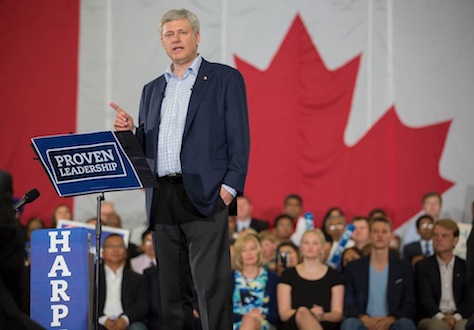 Stephen Harper has a timing problem.
Stephen Harper has a timing problem.![]()
Last week, Canadian officials announced that GDP contracted by 0.2% in May, the fifth consecutive decline in the country’s economic growth. If on September 1, statistics show a further decline for June’s GDP measurements and confirm the earlier 2015 data, Canada will officially be in recession — the generally accepted technical definition amounts to two consecutive quarters of negative GDP growth. Stephen Poloz, the governor of the Bank of Canada, recently cut the benchmark interest rate to 0.5% in July, and he may take further steps to loosen monetary policy if economic conditions continue to deteriorate.
For a prime minister seeking a fourth consecutive term in a general election on October 19, that presents a significant difficulty — and the economy will almost certainly loom large during the campaign’s first debate tonight.
Even if Canada doesn’t technically enter a recession during the election campaign, it will be an unwelcome distraction for a prime minister who in 2011 benefited from the perception that his government’s economic leadership saw Canada through the worst of the US-originated global financial crisis.
Now, both Liberal leader Justin Trudeau and New Democratic Party leader Thomas Mulcair will be able to use the economy’s flagging performance as a weapon against Harper. In particular, Mulcair’s emphasis on creating jobs has boosted the NDP to a (very narrow) first place in polls. In May’s provincial elections in Alberta, Rachel Notley and the Alberta New Democrats rode a wave of voter dissatisfaction to end 44 years of consecutive Tory rule. The outgoing premier, Jim Prentice, only recently returned to politics after a prior stint as a Harper loyalist in federal government, became the first political victim of lower oil prices in energy-rich Alberta.
He might not be the last.
Nevertheless, it’s still too soon to rule out Harper’s chances for success. Polls show that the Tories are either tied with the NDP or running a very close second. The first-past-the-post nature of Canadian elections means that Conservatives could win many ridings without 50% or more because left-leaning and moderate voters could split between NDP and Liberal candidates — especially in all-important Ontario, home to 121 ridings.
Moreover, amid the gloomy economic forecasts, there are at least three silver linings for Harper.
First, the recession may be so narrow — and so recent — that it still won’t feel like a recession to many voters. Job losses are typically a lagging indicator in a recession and, if growth bounces back later in the year or if economic data are revised upward, the effects of a shallow recession (or non-recession) will not necessarily feel so bad.
Second, after a decade in which Canada became increasingly reliant on energy production to boost its economy, the slump in oil prices could actually diversify the Canadian economy. The last time Canada went into an election, the Canadian dollar was worth more than the US dollar. Today, it’s at its lowest level (US$0.76) since 2004. That’s good for tourism, and it’s already been very good for exports, vastly reducing Canada’s trade deficit. Harper will be able to make the eminently reasonable case that there’s little he can do to shift global oil markets or underlying Chinese demand, but that the weaker Canadian dollar is giving Canada new opportunities to stabilize its economy in the long run.
Finally, expect that Harper will attempt to turn the tables on his two opponents by arguing that they would exacerbate Canada’s economy in power by raising the tax burden and creating a more hostile environment for investment and business. Trudeau has pledged to cut income taxes for middle-class Canadians, but at the expense of raising taxes for the highest earners. Though Mulcair, sensitive to notions that Canada’s first federal NDP government might introduce wild spending programs, has pledged not to raise personal income tax at all, he still advocates raising corporate income taxes. Both Liberal and NDP governments would be far more skeptical about cross-country energy pipelines.
As an economic steward, Harper has generally pushed for budget conservatism, at least since 2009. Finance minister Joe Oliver presented a budget earlier this year that attempts to balance Canada’s budget, though declines in oil revenues may result in a small budget deficit. Harper’s first government in 2006 passed legislation to cut the goods and services tax from 7% to 5% (a tax introduced by Brian Mulroney’s Progressive Conservative government in 1991), and Harper spent $40 billion in stimulative measures in 2009. Otherwise, Harper’s governments have consistently tried to balance budgets.
Harper and the Tories will argue during the campaign that Canadians should trust them to continue their prudent economic management, and they will point to the 1.2 million jobs created in Canada under Conservative governments. Mulcair has emphasized the long-term loss of manufacturing jobs, and Trudeau has made much of the lack of opportunities for young Canadians. The competing narratives aren’t necessarily inconsistent.
The Tories would be even wiser to respond that their course of fiscal discipline since 2009 is chiefly in line with goalposts established by the Liberal governments of Jean Chrétien and Paul Martin in the 1990s and early 2000s, and that the Conservatives’ budget prudence will give the next government a broader ability to resort to additional stimulative spending if a recession proves deeper and more painful than currently expected.